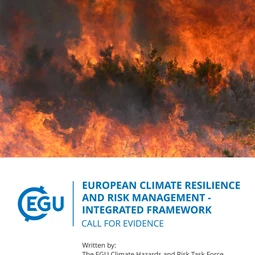The EGU Climate Hazard and Risk Task Force provide evidence for the EU’s proposed ‘European climate resilience and risk management initiative’.
5 September 2025
Climate-induced risks are increasingly interconnected; natural hazards may occur together or in succession, leading to cascading effects that exacerbate their impact. In addition, these hazards rarely affect communities that are not also experiencing challenges from other environmental, social and political problems. In light of this, the European Union has set forward a new proposal to establish a comprehensive and integrated ‘Climate resilience and risk management initiative’ that is founded on science-based risk assessments, an essential step to effectively tackle this increasing complex landscape of risks.
The proposal, which precedes the European Climate Adaptation Plan, set to be presented in 2026, is necessary to ensure policymakers can facilitate a strong and meaningful adaptation to climate change across Europe. In issuing a call for evidence in consultation and using a science-based approach, this proposal has the potential to improve the safety of European civilians and infrastructure; strengthen the understanding and preparedness of its citizens; increase collaboration and coherency between European member-states, and different sectors; and stimulate economic growth through the implementation of co-beneficial solutions and innovation. As an organisation that works to encourage science-informed policy, EGU applauds the Commission’s commitment to including scientific evidence during the development of this initiative, and offers our support to both the European Parliament and Council in their discussion and debate on the future legislation.
On 4 September EGU’s Climate Hazard and Risk Task Force answered the call for evidence and set forward seven recommendations that reflect the critical need to adopt a multi-hazards approach to risk assessments, in order for the initiative to be comprehensive. Critical to these recommendations is the understanding that adaptation strategies in the proposed initiative must consider both their interconnectivity between risks and their solutions, and be implemented over a long time-period. The complexity of climate-induced risks also require that any initiative must recognise that the impacts of climate change are unevenly distributed, and therefore prioritise high-risk regional ‘hotspots’. The recommendations also state that citizen preparedness can be strengthened by increasing public engagement with civil protection mechanisms , including via the full integration of informed and consenting local and indigenous communities. Collaboration and readiness in the face of climate-induced hazards can be improved by advancing Earth Observation systems, particularly through integrating monitoring approaches and improving data accessibility. This will be necessary to prepare Europe for a new normal of complex, interconnected risks.
With the inclusion of these specific aspects in future legislation, the EGU believes that this initiative will be a vital step forward towards a more resilient and prepared Europe, providing a timely and critical path for harmonisation between states and sectors, empowering them to act and protect their citizens. Read the full document answering the call for evidence here and find out more about the EGU Climate Hazard and Risk Task Force here.
More information
As Europe’s largest geoscience society, the European Geosciences Union (EGU) is uniquely positioned to facilitate the transfer of knowledge from research into practice and to connect policymakers to the most relevant geoscience experts. In early 2025, EGU’s Science for Policy Working Group created the EGU Climate Hazards and Risk Task Force with the aim of bridging the gap between science and policy, delivering scientific information and expertise to where it is most needed. The Task Force is also available to support policymakers on both a European and Member State level by answering evidence-based questions, translating scientific research, participating in meetings, writing fact sheets, and providing summary documents to help policymakers understand the legislative relevance of ground-breaking geoscience research. For further information, please contact policy@egu.eu.
Contact
Simon Clark
EGU Projects Manager
projects@egu.eu
Zsanett Gréta Papp
EGU Science for Policy Officer
zsanett.papp@egu.eu
Links
Share this
Media

